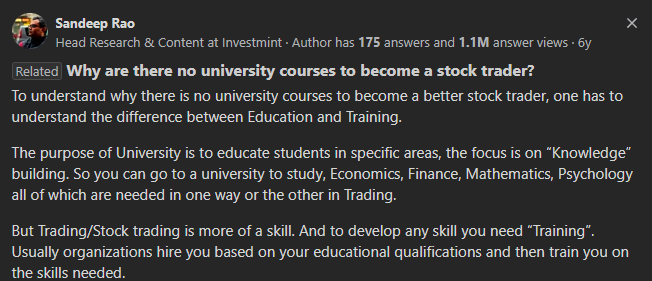Reason 1: The Underappreciated Embeddedness of Trading in our Existence
Some scholars argue that the concept of trading predates humanity itself, suggesting trade may be intertwined with the very roots of our intelligence. Numerous studies illustrate that animals engage in forms of trade. Yet, there persists a disdain for traders, branded as "mere speculators" which is okay, as they basically use math to outplay other players. People do not want to see themselfes as traders, as taking from other players of the game of life is hated. Beeings want as much as possible for themselfes and their own group so they create an environment where taking is seen as something bad (without beeing able to admit that in front of anyone else or themselfes as our very moral compass of good and bad latches onto that. People are bad with not beeing hypocrites).
This disdain stems from a lack of understanding that trading is an inherent aspect of existence, engaged by all, whether consciously or not. The misconception that assets like property or fiat currency are not part of the trading spectrum reveals a fundamental misunderstanding of their nature as trading positions. There is no such thing as cashing out from the market, this is just another trade itself. You exchange one position for another.
Reason 2: Misconceptions About Money and Value
Many fail to grasp that banks don't truly "lose" money on defaulted loans, as money is essentially created upon borrowing (when you and i borrow). States on the other hand can not really default on loans (in their own currency) either, as they can always print money if needed.
The silent theft of wealth through inflation goes unnoticed by many, who, if fully aware, might actively protest the erosion of their purchasing power.
Trading is an intrinsic aspect of natural existence. Leverage and arbitrage, often misunderstood or maligned, are simply logical extensions of basic economic principles present in nature and human behavior. If you can borrow, you can leverage. If there are markets selling the same assets for different prices, arbitrageurs will try to establish an economic balance where the goods cost the same on different markets and make a profit of it.
Reason 3: The Challenge of Navigating Uncertainty
Trading and fields like Information Security share a critical skill: the ability to operate effectively amidst uncertainty. Many non-traders think trading is about gaining certainty, feeding a supercomputer with essential data or knowing insider information.
But there is another way of trading that involves making informed bets based on historical psychologic patterns reflected on charts, called technical analysis. This is the way that everyone that has a computer can learn and throw their might into the ring with even the biggest players. And it is only about tipping the odds in your favor, instead of knowing for certain what will happen.
Interestingly academics are the ones who seem to have the biggest problems with this uncertainty in trading. For overanalyzing closed-minded academics the aversion to embracing imperfect or unproven ideas can lead to missed opportunities, particularly in volatile markets where unconventional wisdom often prevails. They often think that trading is just a gamble in a completely random game, which is of course not true.
It is true that no one knows the everchanging rules while some market makers create and influence part of the rules. That does not mean, that there are no winning tactics to play this game though. Here is a nice quora question with diverse answers on why there are no real universities where you can learn trading the stock market: https://www.quora.com/Is-there-a-college-and-university-to-learn-trading-in-the-stock-exchange

Academics are often educated, but neither wise nor smart.
Many good traders are not mathematical wonderchilds, but brave adventurers willing to constantly try and fail and learn until they grasp the bigger ideas and have a shield of experience protecting them from (more) stupid decisions.
Reason 4: Emotional Cycles and Market Timing
The cyclical nature of markets demonstrates a common pattern of emotional investing at peaks driven by euphoria and selling in the troughs of despair at the bottom. Escaping this cycle is crucial to investment success.
Cryptocurrency markets serve as a prime example, where the widespread hype among the general public can signal a market peak, suggesting a strategic exit or short position might be prudent. Conversely, the bear market, often a period of ridicule or indifference towards crypto, presents the best opportunities.
Bull markets make you money, bear markets make you rich.
Reason 5: Going insane and/or bankrupt before finding ones style
Like in extremely competitive world-class sports a big part in trading is about managing ones emotions correctly.
It is very easy to get complacent on papergainz, and go bragging and afterwards getting cringed bcs you blew up your trading account. You just want to give up, say you have no talent and forget all of it. Because of your past bragging now having giant losses in time spent, taxes and size, you are rightfully embarassed.
Past:"Darling i can't spend time with you today i need to trade.", present: "You spent so much time just to lose all your money?".
Then you leave the market during it's deepest darkest point instead of buying there heavily discounted.
Reality is that when you look at the history of most of the most successfull traders, they went through excactly such a cycle at least once, sometimes twice. They never gave up though and where even more motivated to prove everyone wrong who doesn't believe in them. Best advice here is to start slow and with small sizes and be aware that it might take years and sometimes an existential crisis to really become sustained profitable. Resist the thrill and the greed, resist bragging on papergainz, resist thinking you are smart because you are making profits on longs in a bull market/bubble.
Start slow and increase the pace controlled and do not give up.
Trading is a long lasting learning process until you have found your style. Some of the things that you need to combine to match your character, that form your style include:
- Are you a visual trader that looks at charts, or are you more an analytical trader looking at databases, tables, and numbers?
- Are you a predictive trader, that tries to frontrun changes in trend and scores massive gains if he is right or a reactive trader, that searches for confirmation before entering a position?
- What is your timeframe? Ultrafast split-second decision making sitting in front of the 1-minute chart or swing trading where a position can be open for days?
- What is your signal and your filter to enter into a direction of the market?
- Are you a manual trader or an automatic trader that creates bots to do the trading for you?
- Where do you take profits and stop losses?
- What position sizes should you take per bet?
- What factors influence the markets that you trade in indicators and fundamentals?
